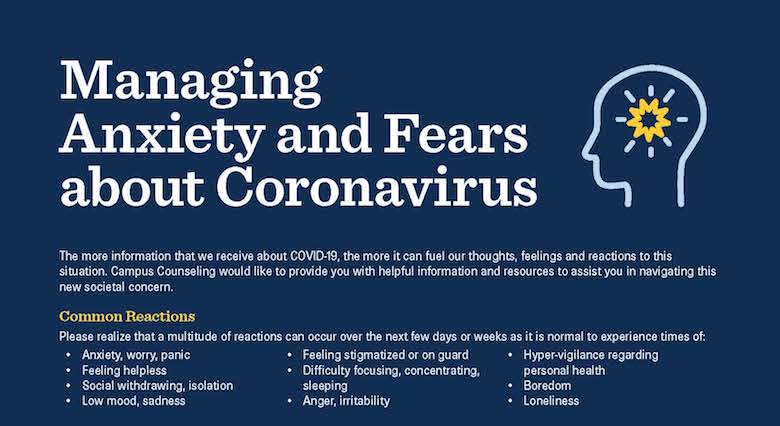Feeling stress caused by the pandemic? Melissa Gaudio, Theresa DaKay and Amanda Leonard, who are counselors in Wilkes University’s Health and Wellness Services, shared information to help students, faculty and staff weather the pandemic. Here is a summary of their advice:
The more information that we receive about COVID-19, the more it can fuel our thoughts, feelings and reactions to this situation. Campus Counseling would like to provide you with helpful information and resources to assist you in navigating this new societal concern.
Common Reactions
Please realize that a multitude of reactions can occur over the next few days or weeks as it is normal to experience times of:
- Anxiety, worry, panic
- Feeling helpless
- Social withdrawing, isolation
- Low mood, sadness
- Feeling stigmatized or on guard
- Difficulty focusing, concentrating, sleeping
- Anger, irritability
- Hyper-vigilance regarding personal health
- Boredom
- Loneliness
Ways to Manage Fears and Anxieties
Although the coronavirus is a health issue that is being taken very seriously by the campus and public health authorities, do not let worry control your life. There are many simple and effective ways to manage your fears and anxieties. Many of them are essential ingredients for a healthy lifestyle; adopting them can help improve your overall emotional and physical well-being.
- Get the facts. Stay informed with the latest health and campus information through www.wilkes.edu/coronavirus.
- Keep things in perspective. Limit worry and agitation by reducing the time you spend watching or listening to upsetting media coverage. Although you’ll want to keep informed, remember to take a break from watching the news and focus on the things that are positive in your life and things you can control.
- Follow a solid, daily routine. Focus on self-care! Take a walk or run, go hiking or biking, and breathe in some fresh air. Meditation, yoga, online workouts, listening to podcasts, photographing nature, cleaning out clutter and moving through your online classes are productive ways to occupy your time. Listen to music, play an instrument, read, find a new hobby or resume an old one.
- Be mindful of your assumptions about others. Someone who has a cough or a fever does not necessarily have this illness. Self-awareness is important — don’t stigmatize others in our community.
- Stay healthy. Adopting healthy hygienic habits such as washing your hands with soap and water for 20 seconds or an alcohol-based hand sanitizer, frequently, and certainly after sneezing or before/after touching your face. Cover your mouth and nose with a tissue or your sleeve (not your hands) when coughing or sneezing. Avoid touching your eyes, nose and mouth.
- Avoid contact with others who are sick and stay home while sick. Eat well; get enough sleep (ideally 7-9 hours per night); exercise in your living space or safely outdoors maintaining a six-foot distance from others. Stay away from alcohol and drugs as a way of coping as they will only create more problems.
- Keep connected. Maintaining social networks or “virtual” connection with peers, friends, family can help maintain a sense of normalcy, and provide valuable outlets for sharing feelings, reducing the sense of loneliness and relieving stress. Download apps like Headspace, Moodpath, PTSD Coach or Calm for relaxation exercises.
Students overwhelming worry or anxiety can seek additional professional mental health support. Please contact our 24/7 After Hours Support Line, 570-408-CHAT. Please note that the chat line is for Wilkes University students only. Or, if you do have access to a professional therapist, please contact them regarding phone or online sessions.
Above all else, remember that we are all in this together. As a campus community, we will overcome these challenges. We are Colonel Strong!






